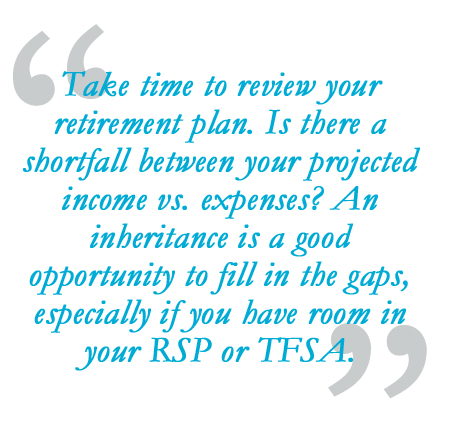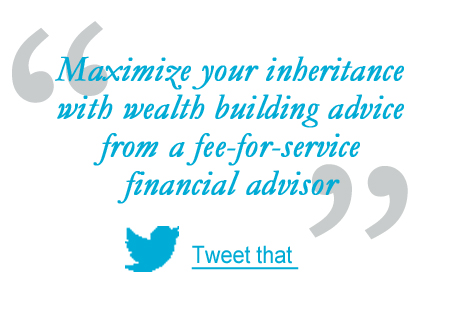
Waiting for an inheritance is not a solid financial plan, but the fact is in the most recent available Survey of Financial Security (2019) Statistics Canada reported that the total net worth of Canadians 65 or older was about $3.67 trillion, and much of that legacy will be passed on. Those on the receiving end of a generous bequest can make a real impact on their financial well-being, but only if they make the right choices in the short and long term.
There are many ways to use a large inheritance, and we’ll look at several of them in this article. But, whenever you receive any kind of financial windfall, the first thing you need to do is catch your breath.
Take a Deep Breath and Park Your Money
The gift of an inheritance is often bound to the sadness of loss. Allow yourself time to grieve. Don’t make important decisions for at least three or four months. Park the assets in a high interest savings account – which actually pay decent interest these days – until the emotional fog begins to lift. In fact, parking your money is good advice for any sudden financial windfall. The shock needs to normalize before you make decisions.
When you are ready to make some decisions, they should be made within the parameters of a comprehensive financial plan.
Here are some of the options to consider.
Pay Down Debt
Freedom from debt has so many payoffs it’s always an excellent option. Not only are you free from the weight of what you owe, the amount saved in interest often makes debt repayment a better (and safer) return on investment than the investment market. Paying off a $10,000 credit balance that charges 19.99% interest can save you up to $1,999 a year, about triple what you could hope to earn on a $10,000 investment in stocks and bonds in one year. Start by paying your highest interest credit card debts and then move to car loans, personal loans and lines of credit, and mortgages.
Freedom from debt goes beyond your financial well-being to your emotional well-being as well. Eliminating debt lifts an emotional weight off your mind. Debt stress affects self-esteem and creates tension in relationships. Using your inheritance to eliminate this burden is a smart choice.
Establish an Emergency Fund
Three to six months of living expenses is the typical recommendation for an emergency fund. There should be enough to keep you and your family afloat in the case of a job loss, illness or other unforeseen impact on your income. But how many people are able to actually put this amount aside? It can be challenging. A substantial inheritance allows you to create or top-up this important financial buffer.
 Fund Your Retirement
Fund Your Retirement
Take time to review your retirement plan. Is there a shortfall between your projected income vs. expenses? An inheritance is a good opportunity to fill in the gaps, especially if you have room in your Registered Retirement Savings Account (RRSP) or Tax Free Savings Account (TFSA). Or maybe this windfall is an opportunity to expand your lifestyle goals for retirement. Working with a financial planner to maximize this endowment is key.
Consider Your Own Legacy
If you have inherited a significant amount of money, it is wise to update your own estate plan to take it into account. Perhaps, instead of it becoming part of your general assets, you might like to earmark it in a special way. You could use a portion of the funds to set up a trust for your children or make a bequest to a cause that is important to you.
Help Your Own Kids Out
If your own needs are adequately taken care of, perhaps you want to use your inheritance to help your own children now. If you have young or teenaged children, you may want to add money to their Registered Education Savings Plan (RESP) accounts to ensure they have the money they will need in a few years for their post-secondary studies.
The added bonus is that the Canada Education Savings Grant (CESG) will match at least 20% of your contributions (up to a $500 grant, with potential for an additional income-tested grant of up to $100) on an annual basis to a maximum lifetime grant of $7,200 per child.
Treat Yourself and Honour Your Benefactor
Impulsively spending an inheritance under the guise of “found money” may sound fun, but if you miss the opportunity to improve your financial well-being, you will probably have regrets.
That said, using some of the money for a special purchase or experience has merit. For example, if the money is from a parent, perhaps mom or dad would have been happy for you and your children to visit the country of your parent’s birth.
Another option is to donate to a cause that was important to your benefactor in their honour.
Make the Most of This Opportunity
You have been given an incredible opportunity to improve your financial well-being. Make the most of it by considering all your options. But don’t make decisions while you are grieving.
You need a plan. Consider working with an advice-only financial planner, that is one who doesn’t sell investments and specializes in advice that is free from any conflict of interest — an advisor that sells investments is likely to default to suggesting that you invest your new wealth. An advice-only planner will help you consider a broad range of options that support your personal goals.
Ultimately, the decisions you make can change your financial future and perhaps even the financial future of your children. An inheritance is a loving gift that needs to be handled with care.
We hope this article has been helpful and provided some practical advice on how you can improve your financial well-being. If you need additional support, please contact one of our Money Coaches today.
This post first appeared in 2017. It has been updated with current data and/or information and republished.




Nice post! Thanks.
I will inherit money from my mother when she passes away. I will be keeping this money separate in order to avoid any commingling with any joint assets I have with my husband. If I predecease my husband .. does he get that money? If I leave the money I inherited to my nieces/nephew via a Will .. is my husband still entitled to receive some of that money?
Thank you Ingrid for your interesting question. If you pre-decease your spouse and you did not leave a valid will, your estate is considered intestate (without a will) and your assets will be dispersed following provincial guidelines- which may include a portion to your spouse. If you leave these inherited assets to your nieces and nephew via a valid will, it is less likely that your spouse would be entitled to it. Everyone’s estate planning needs are different to their own situation and wishes. I recommend you work with a Money Coach to determine your goals and wishes, and also to consult a lawyer to determine the best Will process for you.
I just received a large inheritance i did pay my debts off. What i am looking for help with is someway of investing monies for my families future we have an 8 year old and looking out for his future. Our house has no mortgage ws own it. We are in our mid 40s and just exploring options.
Kim- thanks for your comment. And good work on paying off your debts. Before spending any of the remaining money, create a plan first. Start with what outcomes you want to see in the future. Things like your son’s education, a new car in the next few years, retirement at age 60 etc. Once you have a clearer idea of what you would like to see, then you assign a price to it. Son’s education $100,000 or a new car $50,000. And are you currently prepared for life’s risk like early death, disability or other emergencies? When you have a sense of where the money is needed for the events or things you want, it’s easier to know what products or investments are needed. I’d suggest that you check out our Investment Report Card or book a free consultation with a Money Coach to help you discuss your plan and possible solutions.